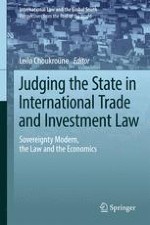2016 | OriginalPaper | Buchkapitel
5. Investor-State Arbitration Distorted
When the Claimant Is a State
verfasst von : Julien Chaisse, Dini Sejko
Erschienen in: Judging the State in International Trade and Investment Law
Verlag: Springer Singapore
Aktivieren Sie unsere intelligente Suche, um passende Fachinhalte oder Patente zu finden.
Wählen Sie Textabschnitte aus um mit Künstlicher Intelligenz passenden Patente zu finden. powered by
Markieren Sie Textabschnitte, um KI-gestützt weitere passende Inhalte zu finden. powered by
